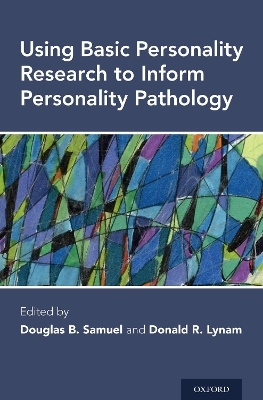
Using Basic Personality Research to Inform Personality Pathology
Oxford University Press Inc (Verlag)
978-0-19-022707-4 (ISBN)
Using Basic Personality Research to Inform the Personality Disorders will present the work of prominent thinkers at the intersections of social, personality, developmental, and clinical psychology to consider theoretical and empirical issues relevant to how basic personality research can inform the scientific understanding of personality pathology. Surveying cutting-edge research on the science of basic personality and demonstrating how these ideas and methods can be applied to the conceptualization of pathology, the book first provides a historical overview, followed by an account of the current state of the personality disorder literature. Ensuing chapters highlight critical issues in the assessment and conceptualization of personality, its development across the life course, and biological underpinnings. These chapters are valuable primers on the basic science of personality, from specific genes to complex social interactions. Furthermore, each chapter aims not only to elucidate current understandings of personality, but to demonstrate its direct application to clinical diagnosis and conceptualization. Using Basic Personality Research to Inform the Personality Disorders is the first edited volume to present such diverse perspectives across biological, developmental, clinical, and social psychology from leading researchers in basic and disordered personality, and will be of interest to a broad range of students, scientists, and practitioners.
Douglas B. Samuel, Ph.D. is Associate Professor of Psychological Sciences at Purdue University. His research focuses on investigating dimensional models, particularly the Five Factor Model of personality, with the aim of improving the conceptualization of psychopathology. He is particularly interested in investigating how multiple sources (clients, therapists, informants) and methods (EEG, ecological momentary assessment) can be integrated to better assess and diagnosis mental illness. Donald R. Lynam, Ph.D. is Distinguished Professor of Psychological Sciences at Purdue University. His research examines the contribution of individual differences to psychopathology and deviance across the lifecourse. Much of his work uses general models of personality to re-conceptualize more complex constructs (psychopathy, narcissism, impulsivity, et cetera).
About the Editors
Contributors
Section I: Introduction to Personality Disorders
Chapter 1. Historical Overview of Personality Disorders
Thomas A. Widiger
Chapter 2. The Current State of Personality Disorders through the Lens of PDTRT
Carl W. Lejuez, Alexis Matusiewicz, Nadia Bounoua, & James Soldinger
Chapter 3. Personality Disorders as Collections of Traits
Joshua D. Miller
Section II: Assessment Methods and Issues
Chapter 4. Using Basic Personality Process Models to Inform the Personality Disorders: Core Momentary Stressor-Symptom Contingencies as Basic Etiology
William Fleeson, R. Michael Furr, Malek Mneimne, & Elizabeth Mayfield Arnold
Chapter 5. The Interpersonal Situation: Integrating Personality Assessment, Case Formulation, and Intervention
Christopher J. Hopwood, Aaron L. Pincus, Aidan G. C. Wright
Chapter 6. Personality Dysfunction and Trait Extremity: Conceptually, but not Empirically Distinct?
Lee Anna Clark, Elizabeth J. Daly, Stephanie Larew, Hallie Nuzum, Thomas Kingsbury, Jaime L. Shapiro, Xia Allen, & Eunyoe Ro
Section III: Development Across the Life Course
Chapter 7. The Principles of Personality Trait Development and their Relation to Psychopathology
Brent W. Roberts & Rodica I. Damian
Chapter 8. Advances in Child Personality Research and Relevance for Personality Pathology
Jennifer L. Tackett, Kathleen W. Reardon, Kathrin Herzhoff, & Shauna C. Kushner
Chapter 9. The Prevalence, Stability, and Impact of Personality Pathology in Later Life: Preliminary Findings from the SPAN Study.
Thomas F. Oltmanns & Steve Balsis
Section IV: Biological Bases of Personality
Chapter 10. Personality as Adaptation: Perspectives from Nonhuman Primates
John P. Capitanio & William A. Mason
Chapter 11. Molecular Trait Psychology: Advancing the Field by Moving from Gene-Hunting to Tool-Making
Turhan Canli
Index
| Erscheinungsdatum | 12.03.2019 |
|---|---|
| Verlagsort | New York |
| Sprache | englisch |
| Maße | 236 x 155 mm |
| Gewicht | 544 g |
| Themenwelt | Geisteswissenschaften ► Psychologie ► Klinische Psychologie |
| Geisteswissenschaften ► Psychologie ► Psychoanalyse / Tiefenpsychologie | |
| Geisteswissenschaften ► Psychologie ► Sozialpsychologie | |
| ISBN-10 | 0-19-022707-9 / 0190227079 |
| ISBN-13 | 978-0-19-022707-4 / 9780190227074 |
| Zustand | Neuware |
| Haben Sie eine Frage zum Produkt? |
aus dem Bereich


